Graphic novels are visual ways of telling stories using dialogue, thoughts, and narration combined with artwork in sequential panels. Graphic novels belong in literacy-centered classrooms along with other trade books to teach essential skills and to foster reading for both learning and pleasure. The books reviewed this week are representative of the ever-increasing diversity of graphic novels and are engaging and enriching for readers of all ages.
Ages 4–8
Andrew the Seeker (Game for Adventure #1). Lee Nordling. Ill. Scott Roberts. 2017. Graphic Universe/Lerner.
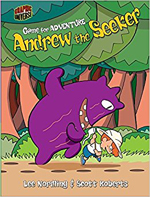 After spying a cute-not-scary purple monster outside his window, Andrew (with a safari helmet and butterfly net) goes on a pursuit. He is so intent on tracking the monster that he fails to see it hiding in plain sight. Frustrated, Andrew abandons the hunt, but after spying the monster the next morning, he’s back on. With an adventurous plot that is easy to follow in the colorful and humorous cartoon panels, this wordless book is a strong introduction to the graphic novel for young children.
After spying a cute-not-scary purple monster outside his window, Andrew (with a safari helmet and butterfly net) goes on a pursuit. He is so intent on tracking the monster that he fails to see it hiding in plain sight. Frustrated, Andrew abandons the hunt, but after spying the monster the next morning, he’s back on. With an adventurous plot that is easy to follow in the colorful and humorous cartoon panels, this wordless book is a strong introduction to the graphic novel for young children.
—CA
Crafty Cat and the Crafty Camp Crisis (Crafty Cat #2). Charise Mericle Harper. 2017. First Second/Roaring Brook.
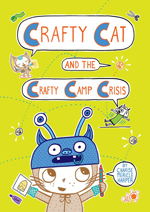 Second grader Birdie is excited about attending the one-day-only Monster Craft Camp on Saturday, but her expectations are dampened as bossy classmate Anya disrupts each of the camp activities. Birdie’s alter ego, Crafty Cat, comes to the rescue and helps her craft her way through the challenges of the day. This second graphic novel in the series with its simple panels of digital sketches in muted colors includes a set of easy-to-follow directions for the five crafts introduced in the story. Crafty kids can look forward to the release of Crafty Cat and the Great Butterfly in spring 2018.
Second grader Birdie is excited about attending the one-day-only Monster Craft Camp on Saturday, but her expectations are dampened as bossy classmate Anya disrupts each of the camp activities. Birdie’s alter ego, Crafty Cat, comes to the rescue and helps her craft her way through the challenges of the day. This second graphic novel in the series with its simple panels of digital sketches in muted colors includes a set of easy-to-follow directions for the five crafts introduced in the story. Crafty kids can look forward to the release of Crafty Cat and the Great Butterfly in spring 2018.
—NB
A Tale of Two Kitties (Dog Man #3). Dav Pilkey. 2017. Graphix/Scholastic.
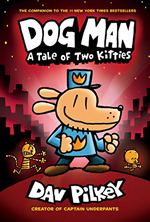 In a foreword, fifth graders George and Harold relate how reading Dickens’ A Tale of Two Cities inspired them to create A Tale of Two Kitties, and provide a “supa recap” of the origin of Dog Man. In this adventure, Dog Man (with the body of a police officer and a head of dog) defends the city against evil doers: Petey, a mad scientist cat, and the diabolical Flippy the Psychokinetic Fish, who organizes an army of Beastly Buildings to gobble up everything in sight. Silly humor abounds in the dialogue and childlike artwork, and the book ends with illustration lessons and a “Read to Your Dog, Man!” section.
In a foreword, fifth graders George and Harold relate how reading Dickens’ A Tale of Two Cities inspired them to create A Tale of Two Kitties, and provide a “supa recap” of the origin of Dog Man. In this adventure, Dog Man (with the body of a police officer and a head of dog) defends the city against evil doers: Petey, a mad scientist cat, and the diabolical Flippy the Psychokinetic Fish, who organizes an army of Beastly Buildings to gobble up everything in sight. Silly humor abounds in the dialogue and childlike artwork, and the book ends with illustration lessons and a “Read to Your Dog, Man!” section.
—CA
Toby Goes Bananas. Franck Girard. Ill. Serge Block. 2017. Graphix/Scholastic.
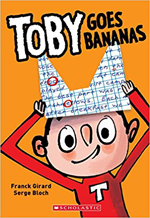 Toby Goes Bananas is essentially a book of jokes tied together by a narrative of a day in the life of young Toby, who always has a snappy comeback ready as he interacts with his parents and younger sister, Zaza, at home and with friends, teachers, and the principal at school. The jokes are silly and eyeroll-inducing—just the kind that young kids love. His teacher, Mrs. Smith, is the perfect foil, setting Toby up for a zinger. For example, his response to her question “Toby, how many planets are in the universe?” is “ALL OF THEM!” Kids will go “bananas” over this graphic/fiction hybrid.
Toby Goes Bananas is essentially a book of jokes tied together by a narrative of a day in the life of young Toby, who always has a snappy comeback ready as he interacts with his parents and younger sister, Zaza, at home and with friends, teachers, and the principal at school. The jokes are silly and eyeroll-inducing—just the kind that young kids love. His teacher, Mrs. Smith, is the perfect foil, setting Toby up for a zinger. For example, his response to her question “Toby, how many planets are in the universe?” is “ALL OF THEM!” Kids will go “bananas” over this graphic/fiction hybrid.
—CA
Ages 9–11
Fish Girl. Donna Jo Napoli. Ill. David Wiesner. 2017. Clarion/Houghton Mifflin Harcourt.
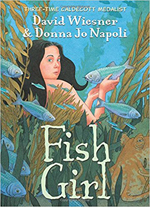 Fish Girl, the main attraction in a boardwalk aquarium, believes the stories that King Neptune tells her. After she makes friends with a human girl, Livia, who names her Mira (for Miracle), she realizes that King Neptune is not the god of the seas but, rather, an immoral fisherman who has kept her captive since she was a baby. After Mira discovers her magical ability to transform between mermaid and human, a storm brews that may free her to live the life she deserves. Napoli’s spare text in boxes and Wiesner’s detailed full-color visual images make this an engaging, easy-to-follow graphic fantasy.
Fish Girl, the main attraction in a boardwalk aquarium, believes the stories that King Neptune tells her. After she makes friends with a human girl, Livia, who names her Mira (for Miracle), she realizes that King Neptune is not the god of the seas but, rather, an immoral fisherman who has kept her captive since she was a baby. After Mira discovers her magical ability to transform between mermaid and human, a storm brews that may free her to live the life she deserves. Napoli’s spare text in boxes and Wiesner’s detailed full-color visual images make this an engaging, easy-to-follow graphic fantasy.
—NB
The Sand Warrior (5 Worlds #1). Mark Siegel & Alexis Siegel. Ill. Xanthe Bouma, Matt Rockefeller & Boya Sun. 2017. Random House.
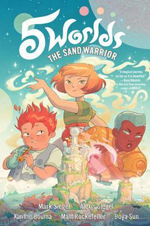 Oona Lee (clumsy young sand dancer), Jax Amboy (star athlete), and An Tzu (ingenious poor boy) band together to save their galaxy after the attack at the Starball Game on Beacon Day. Oona believes that her missing sister Jessa, a sand dancer extraordinaire, is the chosen one who, according to the Sand Warrior Prophecy, can save the Five Worlds from dying with her extraordinary summoning sand dancing to light the dark beacons. But as Oona, Jax, and An are hunted by Mimic and his minions, the trio gets a glimpse into their own unexpected destinies.
Oona Lee (clumsy young sand dancer), Jax Amboy (star athlete), and An Tzu (ingenious poor boy) band together to save their galaxy after the attack at the Starball Game on Beacon Day. Oona believes that her missing sister Jessa, a sand dancer extraordinaire, is the chosen one who, according to the Sand Warrior Prophecy, can save the Five Worlds from dying with her extraordinary summoning sand dancing to light the dark beacons. But as Oona, Jax, and An are hunted by Mimic and his minions, the trio gets a glimpse into their own unexpected destinies.
Readers magically transported into the Five Worlds in this epic science fiction quest will be eager for the sequel.
—NB
Swing It, Sunny! (Sunny #2).Jennifer L. Holm & Matthew Holm. 2017. Graphix/Scholastic.
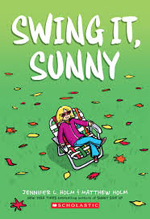 After spending the summer with Gramps in Florida in Sunny Side Up (2015), Sunny Lewin is back home and things are not terrific. She faces the challenges of first year in middle school and the absence of her big brother, Dale, who has been sent to a military boarding school. The short chapters (episodes in The Sunny Show, starring Sunny herself, “a regular girl in a regular world”) include some particularly effective wordless panels that express Sunny’s emotional turmoil as she deals with her problems. Jennifer and Matthew Holms have created a lovable and realistic character in Sunny. Humor lightens things up as Sunny and her best friend, Deb, do what kids did in the 1970s, and her upbeat sunny side continues to shine.
After spending the summer with Gramps in Florida in Sunny Side Up (2015), Sunny Lewin is back home and things are not terrific. She faces the challenges of first year in middle school and the absence of her big brother, Dale, who has been sent to a military boarding school. The short chapters (episodes in The Sunny Show, starring Sunny herself, “a regular girl in a regular world”) include some particularly effective wordless panels that express Sunny’s emotional turmoil as she deals with her problems. Jennifer and Matthew Holms have created a lovable and realistic character in Sunny. Humor lightens things up as Sunny and her best friend, Deb, do what kids did in the 1970s, and her upbeat sunny side continues to shine.
—CA
Ages 12–14
Eagle Strike: The Graphic Novel (Alex Rider). Anthony Horowitz. Adapt. Antony Johnston. Ill. Yuzuru Takasaki & Kanako Damerum. 2017. Candlewick.
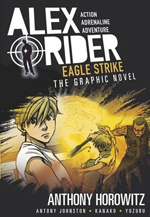 Superspy agent, fourteen-year-old Alex Rider (otherwise known as M16) is on vacation with Sabine Pleasure and her family when their villa is bombed, and her father ends up in a coma. M16 refuses to help him, so Alex is on his own as he searches for the hit man and, in the process, connects a pop star and designer of a video game to a heinous international scheme from which only he can save the world. The story is told through characters’ thoughts and dialogue in digitally colored, manga-influenced panels. This graphic novel adaptation with brilliant action sequences is based on book four of the original Alex Rider series.
Superspy agent, fourteen-year-old Alex Rider (otherwise known as M16) is on vacation with Sabine Pleasure and her family when their villa is bombed, and her father ends up in a coma. M16 refuses to help him, so Alex is on his own as he searches for the hit man and, in the process, connects a pop star and designer of a video game to a heinous international scheme from which only he can save the world. The story is told through characters’ thoughts and dialogue in digitally colored, manga-influenced panels. This graphic novel adaptation with brilliant action sequences is based on book four of the original Alex Rider series.
—NB
Gods and Thunder: A Graphic Novel of Old Norse Myths. Carl Bowen, Michael Dahl & Louise Simonson. Ill. Eduardo Garcia, Tod Smith & Rex Lokus. 2017. Capstone.
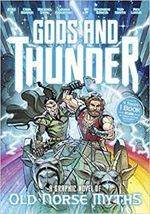 This introduction to Norse mythology in graphic novel format includes four tales of the Norse gods, the Aesirs. In “Thor and Loki,” Thor (the son of Odin) and Loki (a sly, shape-shifting giant who has been raised with Odin’s children) journey into Jütunheim, the land of the giants. In “Thor vs. the Giants,” the thunder god outwits three giants in epic battles. “The Death of Baldur” tells the story of the tragic death of the beloved god of light, the son of Odin and his wife, Frigg. “Twilight of the Gods” chronicles the events of Ragnarök, the final battle that brings an end to the Nine Worlds. A glossary (with a pronunciation guide) is helpful in keeping track of the characters, places, and events in these ancient tales.
This introduction to Norse mythology in graphic novel format includes four tales of the Norse gods, the Aesirs. In “Thor and Loki,” Thor (the son of Odin) and Loki (a sly, shape-shifting giant who has been raised with Odin’s children) journey into Jütunheim, the land of the giants. In “Thor vs. the Giants,” the thunder god outwits three giants in epic battles. “The Death of Baldur” tells the story of the tragic death of the beloved god of light, the son of Odin and his wife, Frigg. “Twilight of the Gods” chronicles the events of Ragnarök, the final battle that brings an end to the Nine Worlds. A glossary (with a pronunciation guide) is helpful in keeping track of the characters, places, and events in these ancient tales.
—CA
The Stone Heart (Nameless City #2). Faith Erin Hicks. 2017. First Second/Roaring Brook.
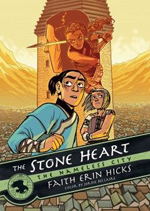 Hicks’ manga-inspired, watercolor illustrations draw the reader into this imaginative political thriller set in The Nameless City in 13th-century China. Three months after The Nameless City, ends, Kaidu (staying with his father, a general at the Dao Palace) and Rat (an orphan living in the Stone Heart Monastery, which harbors secrets that can destroy or save society) are thrown into danger when the General of All Blades is assassinated by his son, Erzi. After Erzi takes command of the city, he steals the secret book Napatha (containing the lost formula for a powerful weapon) from the monastery, which he burns down. Kaidu and Rat hatch a dangerous plan to defeat this political takeover with consequences that may be deadly. Back matter includes an author’s note and a section on the concept art for The Nameless City series.
Hicks’ manga-inspired, watercolor illustrations draw the reader into this imaginative political thriller set in The Nameless City in 13th-century China. Three months after The Nameless City, ends, Kaidu (staying with his father, a general at the Dao Palace) and Rat (an orphan living in the Stone Heart Monastery, which harbors secrets that can destroy or save society) are thrown into danger when the General of All Blades is assassinated by his son, Erzi. After Erzi takes command of the city, he steals the secret book Napatha (containing the lost formula for a powerful weapon) from the monastery, which he burns down. Kaidu and Rat hatch a dangerous plan to defeat this political takeover with consequences that may be deadly. Back matter includes an author’s note and a section on the concept art for The Nameless City series.
—NB
Ages 15+
Shattered Warrior. Sharon Shinn. Ill. Molly Knox Ostertag. 2017. First Second/Roaring Brook.
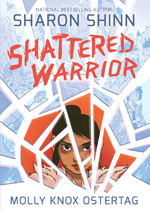 When the Derichets, an evil alien race, invaded the planet for its mineral rights, they killed all of Colleen Cavanaugh’s family—or so she thinks. While working in an oppressive factory controlled by the Derichets, Colleen learns that her niece, Lucy, survived. Reunited, along with Jann (a Chromatti rebel with whom Colleen has fallen in love), they must decide if they will choose enslaved security or fight against the Derichets in the underground Valenchi rebellion to reclaim their world. Created with a muted palette and environmental detail, the action-filled illustrations expand the narrative, thoughts, and conversations in this complex dystopian, sci-fi graphic novel.
When the Derichets, an evil alien race, invaded the planet for its mineral rights, they killed all of Colleen Cavanaugh’s family—or so she thinks. While working in an oppressive factory controlled by the Derichets, Colleen learns that her niece, Lucy, survived. Reunited, along with Jann (a Chromatti rebel with whom Colleen has fallen in love), they must decide if they will choose enslaved security or fight against the Derichets in the underground Valenchi rebellion to reclaim their world. Created with a muted palette and environmental detail, the action-filled illustrations expand the narrative, thoughts, and conversations in this complex dystopian, sci-fi graphic novel.
—NB
Thornhill. Pam Smy, 2017. Roaring Brook.
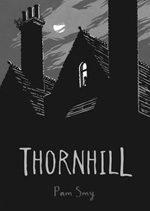 In 2017, Ella, who has moved with her father into a house next to derelict Thornhill Institute, a long-abandoned orphanage, spies a figure wandering Thornhill’s overgrown grounds. In 1852, Mary Baines, a selectively mute orphan beleaguered by bullying, spends her time in her isolated room creating dolls and puppets. Mary’s and Ella’s stories intertwine in alternating sections of text consisting of entries in Mary’s diary and wordless black-and-white graphic sequences of Ella’s exploration of Thornhill that lead to the discovery of Mary’s diary and her repairing of the damaged dolls she finds. Tension builds through both words and images as this engrossing, beautifully-crafted graphic novel/horror story comes to a chilling and disturbing end.
In 2017, Ella, who has moved with her father into a house next to derelict Thornhill Institute, a long-abandoned orphanage, spies a figure wandering Thornhill’s overgrown grounds. In 1852, Mary Baines, a selectively mute orphan beleaguered by bullying, spends her time in her isolated room creating dolls and puppets. Mary’s and Ella’s stories intertwine in alternating sections of text consisting of entries in Mary’s diary and wordless black-and-white graphic sequences of Ella’s exploration of Thornhill that lead to the discovery of Mary’s diary and her repairing of the damaged dolls she finds. Tension builds through both words and images as this engrossing, beautifully-crafted graphic novel/horror story comes to a chilling and disturbing end.
—CA
Nancy Brashear is Professor Emeritus of English from Azusa Pacific University, in Azusa, California. Carolyn Angus is former Director of the George G. Stone Center for Children's Books, Claremont Graduate University, in Claremont, California.
These reviews are submitted by members of the International Literacy Association's Children's Literature and Reading Special Interest Group (CL/R SIG) and are published weekly on Literacy Daily.